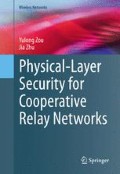Abstract
This chapter explores the employment of joint relay and jammer selection for improving the security-reliability tradeoff (SRT) of wireless transmission from a source to a destination with the help of multiple relays and jammers in the presence of an eavesdropper. We present a joint relay and jammer selection scheme for protecting the source transmission against eavesdropping. To be specific, a relay is selected among multiple relay candidates to assist the source transmission to the destination, while a friendly jammer is employed to emit the artificial noise for preventing the eavesdropper from decoding the source transmission. For comparison purposes, the conventional pure relay selection and pure jammer selection are considered as benchmark schemes. We derive closed-form expressions of both the intercept probability and outage probability for the conventional pure relay selection and pure jammer selection as well as the proposed joint relay and jammer selection schemes over Rayleigh fading channels. Numerical results illustrate that the SRT performance of proposed joint relay and jammer selection is better than that of the conventional pure relay selection and pure jammer selection, showing the SRT enhancement of employing the relay and jammer selection. It is also shown that with an increasing number of relays and jammers, the SRT of wireless communications relying on the proposed joint relay and jammer selection is improved significantly.
Access this chapter
Tax calculation will be finalised at checkout
Purchases are for personal use only
References
Y. Zou, X. Wang, W. Shen, and L. Hanzo, “Security versus reliability analysis of opportunistic relaying,” IEEE Trans. Veh. Tech., vol. 63, no. 6, pp. 2653–2661, Jul. 2014.
J. Zhu, “Security-reliability trade-off for cognitive radio networks in the presence of eavesdropping attack,” EURASIP J. Adv. Signal Process., Jan. 2013
J. Zhu, Z. Liu, Y. Jiang, and Y. Zou, “Security-reliability tradeoff for relay selection in cooperative amplify-and-forward relay networks,” in Proc. 2015 Intern. Conf. Wirel. Commun. & Signal Process. (WCSP 2015), Nanjing China, Oct. 2015.
A. Bletsas, A. Khisti, D. P. Reed, and A. Lippman, “A simple cooperative diversity method based on network path selection,” IEEE J. Sel. Areas Commun., vol. 24, no. 3, pp. 659–672, Mar. 2006.
I. Krikidis, et al., “Amplify-and-forward with partial relay selection,” IEEE Comm. Lett., vol. 12, no. 4, pp. 235–237, Apr. 2008.
Z. Yi and I.-M. Kim, “Diversity order analysis of the decode-and-forward cooperative networks with relay selection,” IEEE Trans. Wirel. Commun., vol. 7, no. 5, pp. 1792–1799, May 2008.
J. Vicario, et al., “Opportunistic relay selection with outdated CSI: outage probability and diversity analysis,” IEEE Trans. Wirel. Commun., vol. 8, no. 6, pp. 2872–2876, Jun. 2009.
Y. Zou, J. Zhu, B. Zheng, and Y.-D. Yao, “An adaptive cooperation diversity scheme with best-relay selection in cognitive radio networks,” IEEE Trans. Signal Process., vol. 58, no. 10, pp. 5438–5445, Oct. 2010
Y. Ge, S. Wen, Y. H. Ang, and Y. C. Liang, “Optimal relay selection in IEEE 802.16 j multihop relay vehicular networks,” IEEE Trans. Veh. Tech., vol. 59, no. 5, pp. 2198–2206, May 2010.
S. Goel and R. Negi, “Guaranteeing secrecy using artificial noise,” IEEE Trans. Wirel. Commun., vol. 7, no. 6, pp. 2180–2189, Jul. 2008.
D. Goeckel, et al., “Artificial noise generation from cooperative relays for everlasting secrecy in two-hop wireless networks,” IEEE J Sel. Areas Commun., vol. 29, no. 10, pp. 2067–2076, Oct. 2011.
N. Romero-Zurita, M. Ghogho, and D. McLernon, “Outage probability based power distribution between data and artificial noise for physical layer security,” IEEE Signal Process. Lett., vol. 19, no. 2, pp. 71–74, Feb. 2012.
O. Edfors, et al., “OFDM channel estimation by singular value decomposition,” IEEE Trans. Commun., vol. 46, no. 7, pp. 931–939, Jul. 1998.
Y. Li, L. J. Cimini, and N. R. Sollenberger, “Robust channel estimation for OFDM systems with rapid dispersive fading channels,” IEEE Trans. Commun., vol. 46, no. 7, pp. 902–915, Jul. 1998.
M. Morelli and U. Mengali, “A comparison of pilot-aided channel estimation methods for OFDM systems,” IEEE Trans. Signal Process., vol. 49, no. 12, pp. 3065–3073, Dec. 2001.
Author information
Authors and Affiliations
Rights and permissions
Copyright information
© 2016 Springer International Publishing Switzerland
About this chapter
Cite this chapter
Zou, Y., Zhu, J. (2016). Improving Security-Reliability Tradeoff Through Joint Relay and Jammer Selection. In: Physical-Layer Security for Cooperative Relay Networks . Wireless Networks. Springer, Cham. https://doi.org/10.1007/978-3-319-31174-6_5
Download citation
DOI: https://doi.org/10.1007/978-3-319-31174-6_5
Published:
Publisher Name: Springer, Cham
Print ISBN: 978-3-319-31173-9
Online ISBN: 978-3-319-31174-6
eBook Packages: Computer ScienceComputer Science (R0)

